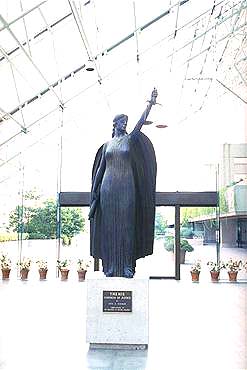 The statute in the picture on the left is in the Vancouver Courthouse of the Supreme Court of British Columbia, Canada. The ancient Greek Titaness Themis, is the embodiment of divine law, order, and custom. A daughter of Uranus, and an early bride of Zeus, she issued her divine edicts to mankind through the great oracle of Delphi. Her later Roman equivalent was Justitia, and artistic representations of justice (blind and impartial – including those shown on this blog) are now typically Roman rather than Greek. However, the statute in the Great Hall of the Law Courts Building in Vancouver (pictured above), is a bronze by Jack Harman and it is explicitly of Themis.
The statute in the picture on the left is in the Vancouver Courthouse of the Supreme Court of British Columbia, Canada. The ancient Greek Titaness Themis, is the embodiment of divine law, order, and custom. A daughter of Uranus, and an early bride of Zeus, she issued her divine edicts to mankind through the great oracle of Delphi. Her later Roman equivalent was Justitia, and artistic representations of justice (blind and impartial – including those shown on this blog) are now typically Roman rather than Greek. However, the statute in the Great Hall of the Law Courts Building in Vancouver (pictured above), is a bronze by Jack Harman and it is explicitly of Themis.
I have written on a number of occasions on this blog about the importance of open justice to the rule of law, and I noticed the following report in Saturday’s Irish Times:
Media challenges McKillen’s bid for secret hearings
Property developer Paddy McKillen’s bid to keep information about his financial dealings out of the public arena during a High Court case in London is to be challenged by a number of newspapers, including The Irish Times.
And today’s RTÉ News brought more information:
Counsel for Paddy McKillen seeks confidentiality over financial information
… Mr McKillen is suing David and Frederick Barclay in a dispute over three London hotels … [and he] is attempting to stop publication of further details of his financial position, which his legal team says will allow the Barclay twins to destabilise the developer in relation to other assets. …
Updates: there’s more in the Irish Times: London court told Barclays would ‘stop at nothing’ (24 April 2012); Media challenges McKillen moves to stop disclosure (25 April 2012):
Besides a ban on the press hearing some of the case, [McKillen] also wants disclosure of some of his affairs permanently kept from the Barclays and Mr Quinlan, though available to their legal teams. The application was opposed by The Irish Times, Independent News and Media, the Guardian, the Financial Times and the London Times Newspapers.
That latter article contains a good summary of the arguments addressed by all sides to Richards J, and that summary reinforces my view that the This claim would almost certainly fail as a matter of Irish law (In re R [1989] IR 126, [1989] ILRM 757 (doc| (pdf); Irish Press v Ingersoll [1994] 1 IR 176, [1993] ILRM 747). For what it’s worth, as I understand the case, McKillen has brought a claim against the Barclays; and since he is seeking the advantages of a court action, he should accept the disadvantages too – if, from his perspective, the principle of open justice is a business disadvantage, that is the price he must be prepared to pay for seeking the benefit of the courts in the first place. It will therefore be interesting to see how this fares in the English courts after R (on the application of Guardian News and Media Ltd) v City of Westminster Magistrates’ Court [2012] EWCA Civ 420 (03 April 2012) (which I blogged here).
Not only was Themis not wearing a blindfold, but she could also predict the future .. but I guess it was more convenient for the Romans if lady Justice were blind (oh, the legacy!).
Thanks for dropping by, Clare! Themis could indeed predict the future, but she did it so obliquely, via the Oracle at Delphi, that we can now call obscure utterances ‘delphic’!
I’d agree about open justice. One of the things that helps prevent further crime, in my opinion, is the public vetting of court trials, and the results.
One the one hand I can understand to some extent the idea that we need to protect the innocent (not sure how that works with Irish Law, but at the same time we need to air dirty laundry to keep crime down.
I think you are confusing Themis for Pytheia. Themis was the first wife of Zeus, born a long time before he did (she was actually the first to hold him), always his confidant and advisor, even when he married Hera. She was the one to put an end to the Trojan war when the time was right.
Themis had a sister, Phoebe, to whom she gifted Delphi (although some writers, if my memory doesn’t escape me Homer in Odyssey too, claim she gifted it directly to her favourite great-nephew, Apollo).
The mantis in Delphi was Pytheia; Themis was never a fortune-teller, especially not of the public. Pytheia, always high on daphne leaves, used to give out “chrysmous” to the travellers and royal representatives of the enumerous ancient Greek kingdoms, usually successfully pointing out their time of doom but advising quite vaguely on a remedy – almost nobody knew what she meant until it actually happened.
PS. I cried my heart out at the muppets, which made people around me laugh twice as hard *sigh*.
Keep sharing the knowledge ;o)